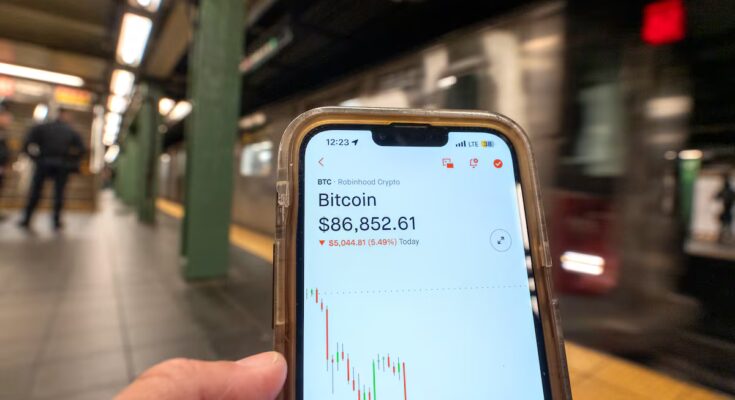The cryptocurrency market does not raise its head. Digital assets are experiencing weeks of strong weakness, with institutional investors reducing positions, record outflows from ETFs and low appetite for retail, amid uncertainty over rate cuts, macroeconomic data and doubts about artificial intelligence. Despite market fragility, Bitcoin had struggled to stay above $100,000, but has now succumbed to the pressure. This Friday it accentuated its declines and reached $95,947.76, dragged by a new wave of risk aversion and the massive sale of technology stocks that gave it the final blow. The fear that the AI bubble is about to burst is growing stronger and Wall Street is already feeling the pinch. Once again, the pioneer cryptocurrency shows one of its big weaknesses: its high correlation with US indices. Nvidia fell 3.6% on Wednesday, dragging down the Nasdaq, which lost 2.3%. Over the past 24 hours, bitcoin has fallen nearly 7%.
The pioneering cryptocurrency, which trades early in the morning at 96,000, has already erased more than $450 billion in value since the beginning of October, due to selling by large investors (exchange traded funds that invest in bitcoin recorded net outflows of around $870 million this Thursday alone, the second largest daily withdrawal since its launch, according to Bloomberg data) and the slowdown in purchases by corporate treasuries, which until now had supported it the price pushing it upwards. Thus, even the year’s earnings have evaporated: since January they have increased by just over 3%, compared to a profitability of 15% for the S&P or 41% for the Ibex. A disappointment for investors, accustomed in the last two years to returns of 120% in 2024 and 157% in 2025.
These falls had already been announced. For weeks the market had been showing signs of fragility and nerves on edge. In fact, almost all assets are trading with the red sign, with more marked declines in the last 24 hours: ethereum collapses by 10%, XRP and solana by 9%, BNB by over 5%. If Bitcoin was already under pressure, investors have tried to avoid it in recent weeks altcoinsless liquid and more volatile assets. Stocks linked to the crypto world are also suffering: the shares of Strategy, the software company that has become the largest accumulator of bitcoin, lose over 28% in the year, and are traded at October 2024 levels. Its capitalization has fallen below the value of the bitcoin it owns, a sign that investors are no longer willing to pay a premium to own the company’s shares and calling into question the highly leveraged model of its founder, Michael Saylor.
According to analysts at 10x Research, weakening flows into ETFs, continued selling by long-term holders and low participation by retail investors, along with risk aversion, are signs that the cryptocurrency market has entered a bearish regime. “When cryptocurrency-specific narratives dilute, correlations with traditional assets increase. This is driving the move today,” Jake Ostrovskis, head of OTC trading at Wintermute, tells Bloomberg. And global markets are in difficulty: for some time, in fact, experts have been warning against the (too) high valuations of the magnificent seven (Apple, Microsoft, Alphabet, Amazon, Meta, Tesla and Nvidia), driven by AI fever. In this scenario, the lack of catalysts and the search for safe haven assets, such as gold and silver, fuel these declines, insists Javier Cabrera, market analyst. Javier Molina, for his part, believes that the recent decline in bitcoin and the cryptocurrency market in general reflects a process of technical readjustment in a more uncertain macroeconomic context, but not a structural change in trend.
Added to this are doubts about macroeconomic data: although the end of the government shutdown provided relief at the beginning of the week, the momentum has now faded. The market expects a high concentration of indicators in the coming days, such as inflation data and the September jobs report, which could weigh on the decision of the already divided Federal Reserve. Indeed, monetary policymakers have been flying blind, after the government shutdown left them without crucial data. Jerome Powell recently hinted that a rate cut in December is not guaranteed, dampening investor expectations.



